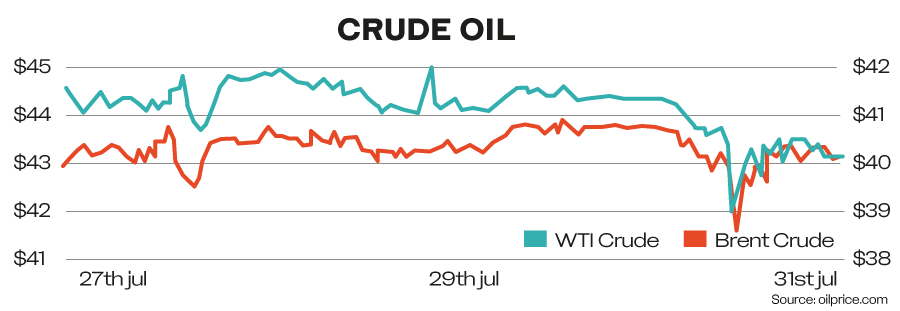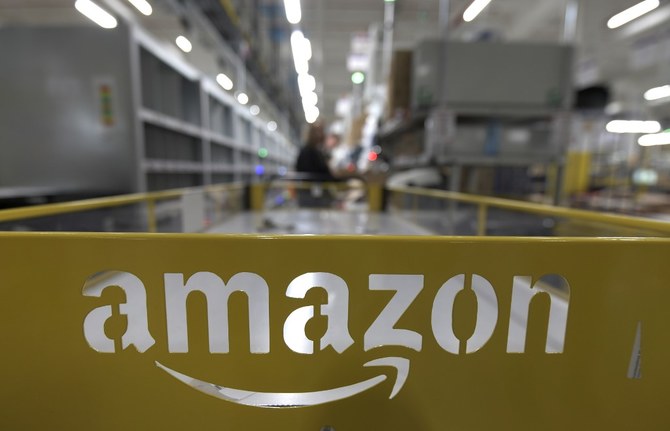The week that was:
US gross domestic product (GDP) contracted by 32.9 percent in the second quarter (Q2) of the year representing a shrinkage of 9.5 percent quarter-on-quarter. American stock markets shrugged the news away because of big tech’s blowout earnings.

Wall Street also seemed oblivious to increased regulatory scrutiny of Amazon, Alphabet, Apple, and Facebook whose CEOs faced a stark grilling by US Congress. They were accused of using their platforms’ dominance to stifle competition.
The US Federal Reserve’s Federal Open Market Committee (FOMC) left rates close to zero. Fed chair Jerome Powell vowed to do whatever it took to get the American economy through the current downturn, employment being of particular concern.
US first-time jobless claims rose for the second time consecutively. They came in at 1.43 million, for the week ending July 25.
Investors fled to gold amid the economic uncertainties and out of fear that the huge stimulus packages across the globe might eventually trigger inflation. On July 27, the price beat its previous record of September 2011 in early Asian trading.

Brent essentially traded sideways for the week amid volatility. West Texas Intermediate (WTI) was trading down on the week. The price of both fell sharply when US GDP numbers were released but recovered equally quickly.

Eurozone Q2 GDP fell by a record 12.1 percent: Germany’s decline was 10.1 percent, propelling the country officially into recession. Italy, Spain, and France came in at 12.4, 18.5, and 13.8 percent, respectively, reflecting just how much the COVID-19 pandemic has affected their economies.
Meanwhile, China proved more resilient. The Purchasing Managers’ Index (PMI) came in at 51.1 percent for manufacturing and 54.2 percent for services. China seems to have recovered steadily from the pandemic after having been hit substantially in Q1.
Highlights of the earnings season:
The highlight of this week was big tech in the US, which blew expectations away. (See Focus) European banks reported a mixed picture.
Shell and Total reported and Exxon will do so after this report is filed, which is why we shall look at big oil next week.
European banks
European banks were a tale of two categories, the former beating expectations and the latter disappointing.
Similar to the US, banks with strong investment banking/trading operations fared better. Earnings also reflected the state of the economy in banks’ home markets.
Deutsche Bank reported a net loss of $90.3 billion and loan loss provisions of $761 million. Credit Suisse made a profit of $1.27 billion and upped loan loss provisions by a lower-than-expected 296 million Swiss francs. Contrary to its previous strategy, the bank will form an investment banking unit.
BNP Paribas reported a net income of 2.3 billion euros ($2.72 billion) and added a further 329 million euros to its loan loss provisions. These banks beat expectations.
The UK and Spanish banks reported results which were in parts much below expectations: NatWest posted a £770 million ($1.011 billion) pre-tax loss and upped loan loss provisions by £2.1 billion. Santander posted a record loss of 11.1 billion euros and booked impairments worth 12.6 billion euros for the quarter.
Focus Big Tech Earnings: Big Tech
Big tech reported blockbuster earnings throughout, beating expectations across the board. There is no comparison to the outstanding performance of the US big tech.
Amazon’s revenue grew to $88.91 billion, net income stood at $5.2 billion and earnings per share (EPS) was $10.3, all beating analyst expectations. Grocery orders tripled compared to a year earlier and capacity increased by 160 percent, which involved higher costs. Advertising revenue grew 41 percent.
Apple reported its largest-ever Q2 revenue with $59.7 billion, net income at $11.25 billion, and EPS at $59.7, again all beating expectations. This result came in a quarter when Apple had to close many of its retail outlets. The company announced a stock split sending the shares to record highs.
Google’s parent company, Alphabet, reported its first revenue decline in history but still beat expectations. Revenue stood at $38.29 billion, net income at $6.95 billion, and EPS came in at $10.13. Cloud revenue grew by 43 percent and advertising revenue fell by 8.4 percent.
Facebook reported a Q2 revenue growth of 11 percent coming in at $18.7 billion. Net income stood at $5.18 billion and EPS at $1.80. The stock rose more than 6 percent in extended trading. Monthly users reached 3.14 billion. Advertising revenues were hit by a boycott of major advertisers. The company expects impacts on ad revenues to level off during Q3. Revenue growth grew despite declining advertising income, which speaks to the strength of platforms such as Instagram. The stock soared more than 6 percent in extended trading, hitting a new high.
The regulatory risks remain for big tech, especially outside of the US. However, in times of economic crisis American lawmakers will be cautious to act against companies which are big employers and helped keep the economy going during lockdown.
Where we go from here:
US macroeconomic and employment numbers proved that while the worst may be over, America, and the world, are not out of the woods yet.
Most economists agree with the Fed’s Powell that the trajectory of the economy is closely linked with that of the virus and how quickly a COVID-19 vaccine and / or anti-viral drugs are discovered.
In the meantime, general consensus points to the necessity of further fiscal stimulus. Several US fiscal programs expire at the end of this month. The discrepancy between the $3.5 billion Heroes Act, passed by the democratically controlled House of Representatives, and the $1 billion package proposed by the Republicans could not be larger – not just in terms of dollar value but structure too.
Democrats ask for the support of local government, while Republicans want to keep further financial outlays to a minimum. Finding consensus before recess is pivotal, considering how much the US economy suffered during Q2.
— Cornelia Meyer is a Ph.D.-level economist with 30 years of experience in investment banking and industry. She is chairperson and CEO of business consultancy Meyer Resources.
Twitter: @MeyerResources




























